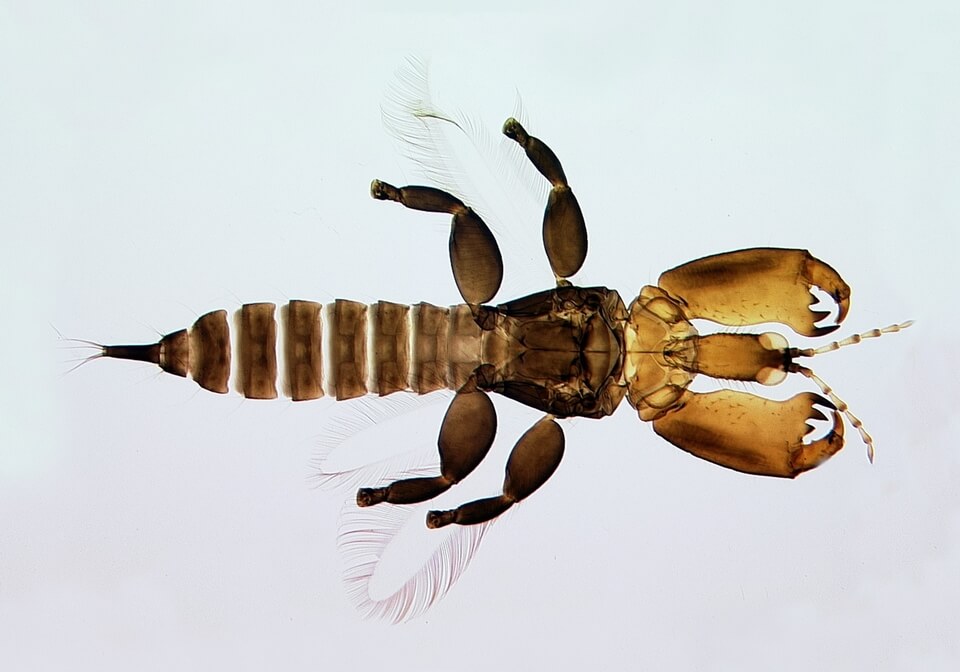Professor William Kirk: The Secret Life of Thrips
Professor of Applied Entomology

Thrips are very small insects that generally go unnoticed, even though they are remarkably abundant throughout the world, consisting of over 6,000 species, of which about 100 are crop pests. As butterflies and bees are larger and attract more public attention, the biology of thrips is just as fascinating. This lecture will describe their diversity and some of their remarkable behaviours, and then the damage they inflict on our crops and the difficulty of their pest control. Thrips are sometimes known as thunderbugs, because of their tendency to land on people just before thunderstorms. They feed on leaves, fruit, flowers, tree bark and fungi, and some prey on smaller creatures, and exhibit a range of social behaviours, from guarding communal egg masses to living in large colonies with soldier thrips to defend the colony. Many thrips damage crops by feeding and transmitting plant viruses, causing around 10-billion dollars of damage per year; however, they are difficult to control because they breed rapidly, are resistant to insecticides, and are hard to detect, meaning they can be accidentally transported on plant material and become invasive pests. One invasive species, the western flower thrips, is a major pest to horticulture worldwide. Thus, growers urgently need new ways to manage this pest, and at Keele, we have identified its aggregation pheromone, resulting in the development of pheromone lures and traps that are used commercially to protect horticultural crops in many countries.
BIOGRAPHY Professor William Kirk completed a BA in natural sciences and PhD at Cambridge University, followed by a Research Fellowship at Emmanuel College, Cambridge, and a Rothman Fellowship at the Waite Agricultural Research Institute, University of Adelaide. He was appointed as a lecturer at Keele University in 1987 and subsequently promoted to senior lecturer and professor. His research on thrips started with his PhD on the ecology of thrips in flowers and has since explored many aspects of thrips biology, particularly those aspects that can be exploited for pest control: his discovery of an aggregation pheromone in thrips led to the development of pheromone lures and traps. Professor Kirk also runs regular courses for beginner beekeepers and is enthusiastic about communicating science to the general public, which he achieves through his writing, such as Plants for Bees and editing the Naturalists’ Handbooks series.
Professor William Kirk completed a BA in natural sciences and PhD at Cambridge University, followed by a Research Fellowship at Emmanuel College, Cambridge, and a Rothman Fellowship at the Waite Agricultural Research Institute, University of Adelaide. He was appointed as a lecturer at Keele University in 1987 and subsequently promoted to senior lecturer and professor. His research on thrips started with his PhD on the ecology of thrips in flowers and has since explored many aspects of thrips biology, particularly those aspects that can be exploited for pest control: his discovery of an aggregation pheromone in thrips led to the development of pheromone lures and traps. Professor Kirk also runs regular courses for beginner beekeepers and is enthusiastic about communicating science to the general public, which he achieves through his writing, such as Plants for Bees and editing the Naturalists’ Handbooks series.
FREE
- Event date
- Event Time
- 6:15PM
- Location
- Westminster Theatre, Chancellor's Building
- Organiser
- Events
- Contact email
- events@keele.ac.uk
- Contact telephone
- 01782 734036

